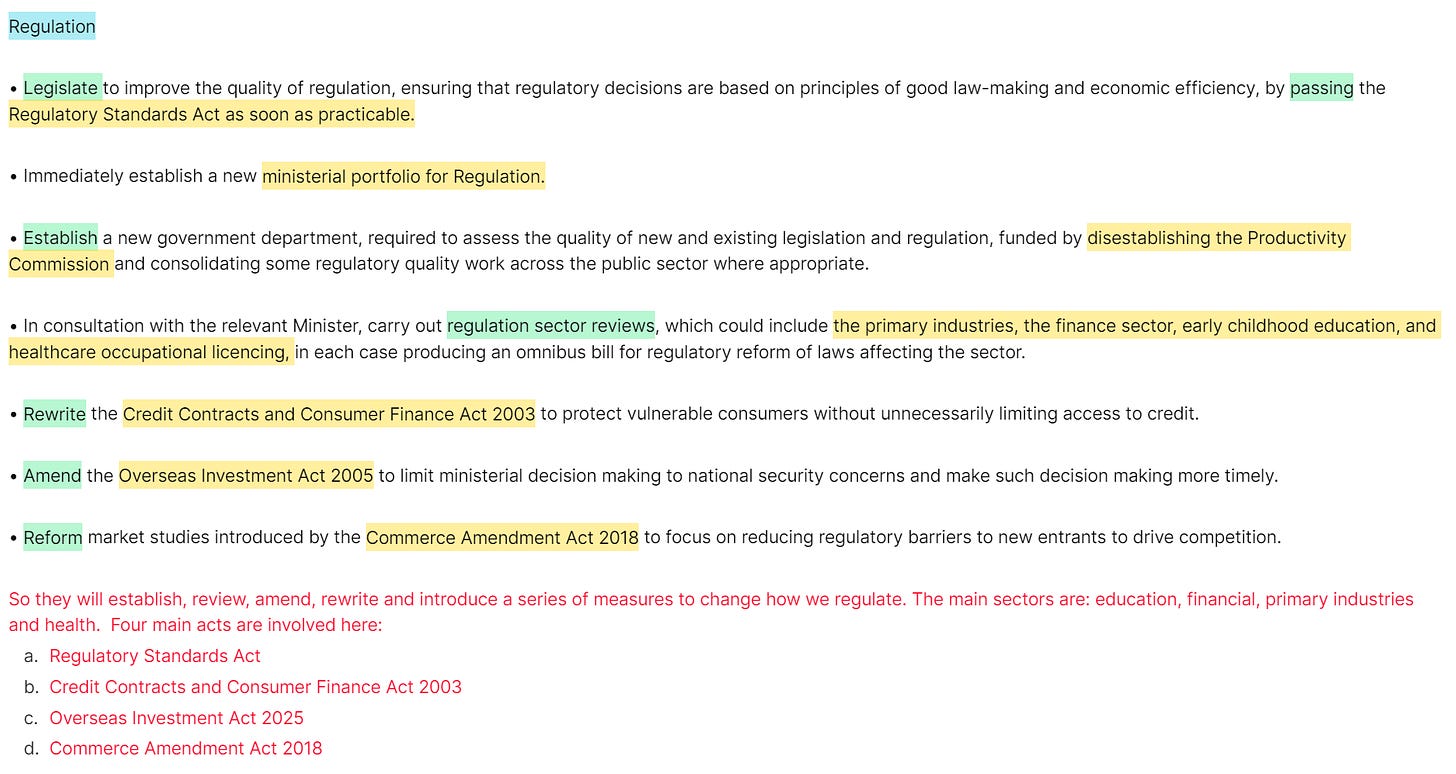Overview of the two coalition agreements - Part One
We have two main documents: the ACT agreement and the NZ First agreement. In summary, not everything matters, and some of it does and is not getting any air time. So what's what?
So what is this government doing?
Well, let's unpack their two coalition agreements and see what matters most and what doesn’t.
Ok, so I have painstakingly gone through line by line of both agreements:
Given how much there is to unpack, I decided to do a bit of a series on this:
Part 1: Understanding the Coalition Agreement
Part 2: Evaluating the Coalition Agreement
Part 3: Impact and Future Considerations
Coalition vs Confidence and Supply vs Collaboration
So before I get to a general overview of the two agreements, the first thing I want to clarify is the difference between a coalition government and a government with a confidence and supply agreement. Russell Palmer from RNZ does a great job in this article of explaining the difference. He explains that there are three types of government:
“A coalition is where two or more parties agree to be in government together. This means those parties each being in Cabinet together, meeting to make decisions on all matters. They may also have negotiated certain policy positions, specific areas of ministerial responsibility, and the rules under which they would support each other.
Confidence and supply agreements are like a watered-down version of a coalition, where one party will agree to support another on the most important matters.
A difference between the two is a coalition typically requires the ministers to support government decisions once they've been made in Cabinet, under Cabinet collective responsibility rules.
Confidence partners on the other hand have a little more leeway to air disagreements outside of any ministerial portfolios.”
In the 2017 government, “Labour and NZ First were in a coalition together, with both holding positions around the Cabinet table and making decisions as a team. The Greens had a confidence and supply agreement, guaranteeing their support to the Labour-led government in return for it introducing a Zero Carbon Act and tackling other policy areas, and giving certain ministerial positions to the Greens.”
Ok, now that these definitions are out of the way, let’s talk about this government’s two coalition agreements.
Each agreement is a standalone document, and that is not an accident; that is by design. Does it matter? Well, yes, a bit. It gives each party a place to showcase where they are aligned and where they are not so aligned but are committed to supporting each other.
The first important clause is the third clause in both agreements. This clause summarizes their priorities as a government, and it is the same in both agreements and states:
3. The Coalition Government’s priorities for this term include:
rebuilding the economy (all three parties)
improving the quality of Government spending and regulation (ACT agreement)
lowering the cost of living (all three parties)
dealing to rising crime by restoring law and order and personal responsibility (all three parties)
enforcing consequences for criminals (all three parties)
ending race-based policies (NZ First agreement)
introducing more choice and competition into social service provision (NZ First agreement)
delivering better health and education (All three parties )
defending freedom and democracy (ACT and NZ First)
providing opportunity for all in education, health, employment, and infrastructure (All three parties )
improving the lives of seniors (NZ First agreement)
These priority statements matter, and there is a lot to unpack here.
The key areas that I think need attention from both agreements are:
Regulation
Immigration
Employment
Democracy
Seniors
Two examples: ACT and Regulation, Democracy and Māori
ACT and Regulation
This is a hefty section because it includes a more formal look at legislation. Its also an important section because ACT and National both campaign hard in this area, so they will have a big mandate to enact these changes.
Below is an image of my initial summary. The words highlighted in green indicate the language that warrants more scrutiny; the yellow highlights are the laws they intend to look at; and the red text is my personal initial summary.

Democracy and Māori
The tension between giving Māori privileges no other group has in New Zealand and not giving Māori privileges other groups have is real. I wrote an article about why this matters and why it is not straight-forward, in case you are curious.
Which is why I think the push for upholding democracy is being a popular one by not only the Crown but by groups like new immigrants and New Zealanders that don’t consider themselves Māori nor Pākeha. So this government attempt to moderate this, even though questionable at best and racist at worst, is not surprising.
I claimed in my masters thesis that, for many reasons, the relationship between Māori and the Crown has created a racial hierarchy that is problematic, and the solution is not easy or straight-forward. This is a reckoning we will all have to do as a country together.
I will keep exploring this part of the agreements further in Part 2: Evaluating the Coalition Agreement and Part 3: Impact and Future Considerations.
What I want to reiterate is my complete disagreement with the idea that if somebody is in favor of democracy, then they are anti-Māori or, at worst, racist. This notion is not only binary, black-and-white, and unhelpful; it is problematic and will keep causing division and fulling polarization. We must allow people to defend the ideas of democracy and freedom of speech if we want to win the war against polarization.
My two cents
Living in Wellington today while trying my best to defend politicians and bring some optimism into the political debate is hard. It's hard for a few reasons: Wellington is one of the most progressive electorates in New Zealand, with a left-wing MP representing the far left that is supposed to work with a right-wing government.
The appeal to left-wing voters hinges on balancing economic pragmatism with social justice imperatives.
I hear day in and day out how people can't stand Christopher Luxon and think David Seymour and Winston Peters are the devil incarnate. There's zero tolerance for any argument that could soften or moderate Wellingtonian views, at least in the circles I move in, which consist of left-wing students, left-wing public servants, and a few scattered right-wing friends.
So, for somebody committed to shining a light on the holes in people's arguments for the sake of developing a more constructive, humble, and realistic conversation, it's hard.
Next week, I will provide a deep dive into a few sections that I think deserve more scrutiny, like the employment, immigration, and seniors sections of both agreements.
See ya next Tuesday!




